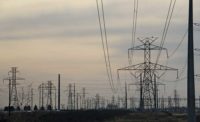State May Buy Transmission Lines from California Utilities
Reaction was muted to a package of proposals billed as "the framework of a recovery plan for Californias investor-owned utilities" announced Feb. 16 by Gov. Gray Davis (D). Utilities took a neutral stance pending information on costs and other details. Consumer groups expressed satisfaction with some aspects of the plan but reserved further comment until more details are known. Only Republican legislators clamored against it, claiming the state has no expertise in the power business.
The plan broadly aims to make resources available for the heavily indebted utilities to recover their financial health without further rate hikes. It would infuse cash into them through a state buyout of the 17,000-circuit-mile electric transmission system, require their parent companies to play a major part in returning their subsidiaries to financial health and obtain dismissal of all pending litigation against the Public Utilities Commission aimed at forcing rate increases. The plan also would create a "dedicated rate component" that utilities could use to retire their debts.
"CAPITULATION." Davis can expect the backing of the overwhelmingly Democratic legislature. But calling the plan "complete capitulation," Assembly Minority Leader Bill Campbell (R) fumed, "These lines could be purchased in the private sector at no cost to taxpayers or our state coffers." Trans-Elect Inc., Washington, D.C., has offered to buy the system for $5.25 billion, according to Electric Power Daily Online, a Platts newsletter published by the McGraw-Hill Cos., ºalso ENRs owner. "Government has no experience in the power business and even less expertise," Campbell adds. "If were such experts, why dont we have enough powerplants and why are two of our utilities in financial disarray?"
Utilities, awaiting further details, are responding cautiously if at all. Insisting that "it is not seeking a rescue or a bailout," San Francisco-based Pacific Gas and Electric Co. said in a terse statement that "the governors framework does not yet meet this objective" of fairness to both shareholders and ratepayers. A spokesman for Rosemead-based Southern California Edison Co., who requested anonymity says, "Were open to the idea, if not receptive."
Consumer groups are praising the proposed state takeover, at least in concept. "We like the idea in theory. In practice, we really need to know how much the governor wants to spend," says Mindy Spatt, a spokeswoman for The Utility Reform Network, a San Francisco-based consumer advocacy organization.
State ownership also would provide "tools to clear some serious bottlenecks," says Doug Heller, a consumer advocate for the Foundation for Consumer and Taxpayer Rights, Santa Monica. "Theres a lot of work that needs to be done on the grid" that the utilities are not undertaking, Heller says, pointing to up to $1 billion in maintenance and upgrades alone estimated by the California Independent System Operator, which oversees about 75% of the states grid.
PINCH POINT. State and industry officials blame rolling blackouts partly on Path 15, a 90-mile section in central California that lacks the capacity to transmit enough power from south to north during peak periods. The state would also assume responsibility for hundreds of millions of dollars in maintenance annually. But Heller says the proposal, which he calls "more a skeleton of a plan than a real substance of a plan, has some very serious pitfalls."
Much of the bargaining will focus on the price, on which the state and utilities are far apart. Edison Chairman John Bryson this month put the value of the grid at $6 billion. But Heller cites estimates of $3.2 billion to $3.8 billion and says the state should be willing to take advantage of the utilities financial straits to get a good price. He criticizes Davis for minimizing the states bargaining position and says the state should purchase it at "a pawn-shop price."
Whether a state takeover of the transmission grid would ease resistance to expanding the grid, such as that being experienced by PG&E as part of a $91-million upgrade of power lines in northern California, is unknown. Residents of Pleasanton dont want the utility to lay a section of 230,000-volt underground cable, and citizens of Livermore are fighting an alternative, a $1-million addition of transmission towers that would affect views from a block of expensive homes.
As state officials and the utilities start hammering out specifics of a possible state takeover, other crucial legislative proposals are in the pipeline. On Feb. 20 the state Senate passed a proposal by Sen. John Burton (D), Senate President Pro Tem, to establish a state power authority to oversee powerplant construction. Approval by the Democratic-controlled assembly and Davis is expected.



